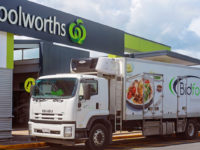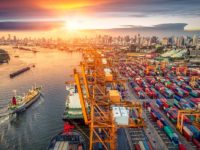
Ethical consumerism is on the rise, with shoppers increasingly aware of brand ethics and staying informed about how companies do business.
Research from Salmat shows that shoppers care the most about ethical behaviour when it comes to groceries, with 50 per cent of shoppers ranking it as the most important category.
Just last year, legislation was introduced requiring businesses in Australia with over $100 million in revenue to report annually on the risks of modern slavery in their operations and supply chains, and actions to address those risks.
Fairtrade has long been an advocate for doing business the right way. One in every two people in Australia recognise the Fairtrade trademark and nearly 90 per cent who recognise it absolutely trust it.
So what can FMCG companies learn from Fairtrade Australia and New Zealand CEO Molly Harriss Olson shared her insights into running an ethical supply chain.
Inside FMCG: Where are FMCG companies falling down in terms of supply chain ethics?
MHO: We’re very fortunate in Australia and New Zealand to have a very strong framework, so it’s easier to do the right thing on our shores, because we have a greater scrutiny from regulators and the media.
But in the modern global trade circumstances, anyone who’s getting supplies from offshore needs to understand the enormous risks that are there and have visibility and auditability across the supply chain. If they haven’t properly interrogated or had partners working with them to interrogate where their primary products are coming from and through what chains of command and visibility they are going through, then they are at serious risk, because the way the global economy is structured is to push the prices to the cheapest.
Things like modern slavery will always be cheaper than doing things properly, with good strong labor laws and the kind of scrutiny and legislation necessary to protect vulnerable parts of the supply chain. So for any company who has a global supply chain, the chances are, if you’re not finding things in your supply chain, then you just don’t really know how to look deep enough.
It’s a “don’t ask, don’t tell” economy out there. But the days of plasuabile deniability are numbered with things like modern slavery.
Inside FMCG: Are bigger companies more likely to have problems in their supply chains than smaller ones?
MHO: Faritrade’s companies tend to have reasonable margins, companies like Unilever and Ben & Jerry’s. The bigger companies have a greater reputation to protect and much greater risk when something does go awry in their supply chain. So often, the larger companies take more care to at least try to figure out how to address these issues. Medium-sized and smaller companies, who can move and shape shift, are the kinds of operations that have nothing to lose.
I think the challenge for businesses is that there’s always going to be a cheaper way. There’s a pressure to keep pushing prices lower and lower, to below the cost of production in so many cases. Slavery is at record highs; 68 per cent of the global profits from slavery in the world today are actually in our part of the world and huge profits are being made off the back of modern slavery.
You can bet that if you don’t know what’s happening past the first tier of your supply chain, there’s every reason to think that there are potentially very major risks.
Sometimes the procurement people aren’t talking to the sustainability people; and sometimes the people who need to understand the issues deeply aren’t the ones who are the ones responsible for tracking those things. Businesses are stretched, and if it’s not a problem that’s present and in your face, then it’s hard to really think about the risks.
Inside FMCG: Is it mostly food companies where these issues crop up?
MHO: Food is an absolutely vital global trading system, and we know that [slavery] is happening in many food supply chains. Even in Australia, there have been some problems identified.
If you don’t have a clear, direct line of sight to the primary producers, anything is possible in today’s world. It is a risky business. Luckily there are a couple of very good certifications like Marine Stewardship Council that can help with things like tuna and seafood. If you’re growing everything in Australia, you have less risk obviously, as there’s tighter regulations.
I would sleep better as the CEO of one of the food and grocery companies if I knew that I had partners on the ground, ready and able to help get that visibility, and ensure that all of the ingredients are being produced to the right standard.
I believe that New Zealand and Australia are fundamentally in a stronger position than many places around the world because we do have much stronger frameworks to be able to operate effectively. It’s when we go offshore that it’s an absolute dog’s breakfast out there.
Our challenge really is also a huge opportunity for companies to really get on the front foot, to make sure that they are doing business in the best possible way, and that they can identify the problems and then do something about it.
Inside FMCG: Consumers have become increasingly interested in brand value and ethics in recent years. Has this been a big driver for companies to be more transparent and take action on these issues?
MHO: In Fairtrade, we’re growing at around 17 per cent a year in a market where most consumable goods are either growing at 2 or 3 per cent. So we can see that there is real growth rate, and we think this is just the tip of the iceberg.
Generations are more and more across these global challenges and are all so aware now. We believe that this is just going to strengthen the brand of any company who wants to take it seriously. Consumers do play and will play a very critical role in finding solutions.
Inside FMCG: So how can FMCG companies ensure they are operating in an ethical supply chain?
MHO: To achieve that greater transparency, we need to encourage businesses to scrutinise not only the immediate suppliers and buyers, but really look further back and learn about where those original commodities come from, and how those products are created and sourced. Because it’s not until you get back to the second and third tiers that you start to see those dark and dangerous places. Everyone needs partners to work through these complex things, and I would really encourage any companies that are interested to reach out and find partners to help them identify and crack these things.
It takes real courage and determination to actually ask these hard questions, and to really gain meaningful answers from your supply chains.
The FMCG world has great people in sustainability in most companies now in Australia and New Zealand and I think it’s a question of really enabling them to do the best they can for the company.















